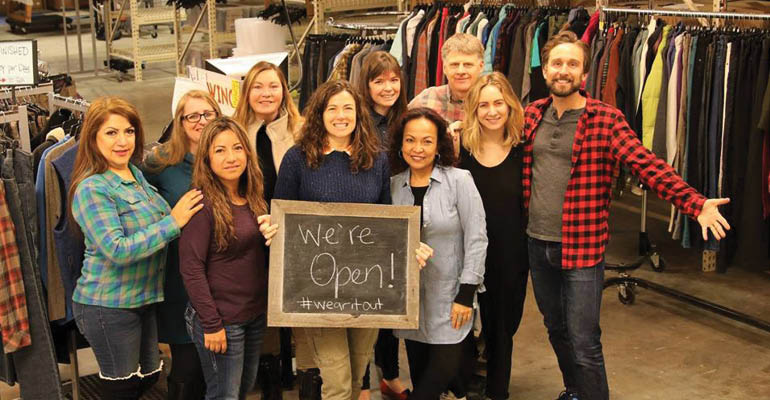The company sells renewed apparel on an online marketplace.

During their years working inside the apparel industry, Nicole Bassett and Jeff Denby watched masses of perfectly usable textiles stockpile in dumpsters. They were fully aware that this was a national trend. In 2014, more than 16.2 million tons of textile waste was generated, according to the Environmental Protection Agency (EPA). Of that, 2.6 million tons were recycled or composted, 3.1 million tons were combusted and 10.5 million tons ended up in landfills.
Recycling more of these materials would have the equivalent carbon footprint impact of removing one million cars from roads, which largely motivated Bassett and Denby to launch the Renewal Workshop.
The Cascade Locks, Ore.-based operation helps brands address textile waste. So far the organization, which launched last September, works with five brand partners who send apparel to Renewal’s 7,500-sq.-ft. space.
“We are trying to figure out solutions for warehouse and distribution centers to deal with returned or damaged products they can’t resell,” Bassett says. “We are refurbishing clothes to put back in the market. But we are also beginning to focus on recycling and upcycling fabrics for other uses once clothes reach the end of their life.”
Filling a void
Material recovery facilities have difficulties processing textiles and brands have limited resources to dispose of what does not sell or gets returned to them. As a result, textiles, with a recycling rate of 16.2 percent are among the least recovered materials.
The startup is addressing the recovery issue by working within the scope of an organized supply chain.
“Recyclers do not have infrastructure to efficiently collect directly from brands or to process,” Bassett says. “So we created a space to collect and organize materials, based on its value, prioritizing higher value items. This would be renewed apparel that can be resold in its original form.” Renewal cleans, quality reviews, repairs and adds a Renewal Workshop label signifying the clothes are refurbished.
As the company’s volumes increase it will focus on materials that will need more work to be salvaged.
“If something’s too damaged to be sold in its original form but has valuable parts we will move it to an upcycling area where we can make something else out of it,” she says. “Finally, when it’s not salvageable we would put it into our recycling area, where it’s organized by material type, and we will send it to recyclers who will turn it into a new yarn.”
Ecommerce opens up business opportunities
The company sells renewed apparel on an online marketplace.
“What’s exiting is ecommerce has allowed access to used clothes all over the country,” Bassett says. “So I don’t have to hope it shows up in my local thrift store. And customers are comfortable buying on line, especially if they know there is a quality control process in place.”
Currently the site is filled with a few thousand items, and brand partners’ shipments come in quarterly. The clothes then go into a large washer. Carbon dioxide (CO2) is used to conserve water. After detergent is added, the CO2 is converted to liquid, enabling the detergent to more easily penetrate fibers. After the cleaning process the liquid is converted back to gas so the clothes don’t have to be dried.
Ibex, an outdoor clothing company in White River Junction, Vt., is among Renewal Workshop’s partners. The manufacturer was already taking back its products from consumers who were done with them and sending what was reusable to charities. If a garment was ruined, the company tried to recycle the garments. But that proved too labor intensive. So material was piling up on the rtailer.
“Renewal has provided opportunities to dispose of products properly but, more important, they provide a solution to refurbish, repair and resell products,” says Keith Anderson, vice president of marketing for Ibex. “We appreciate this because … we use fine grades of Marino wool, so there is a lot of value in the fabric and manufacturing.”
Ibex workers must still receive materials and separate what can be refurbished from what cannot.
“What’s different now is we stockpile returns for Renewal, palletize and ship in a consolidated way versus having to store and find outlets for each bucket ourselves. It’s a one-stop solution,” says Anderson.
“We see value in the products returned to us,” he says. “And especially in the days where there’s a focus on a circular economy, we see [Renewal’s model] to be an elegant solution to putting our clothes back into that circular economy.”
About the Author(s)
You May Also Like




